Top Rankings
Thomasville City Schools School District ranks among the top 20% of public school district in North Carolina for:
Category
Attribute
Diversity
Most diverse schools (Top 1%)
For the 2025 school year, there is 1 public preschool serving 756 students in Thomasville City Schools School District. This district's average pre testing ranking is 2/10, which is in the bottom 50% of public pre schools in North Carolina.
Public Preschool in Thomasville City School School District have an average math proficiency score of 37% (versus the North Carolina public pre school average of 51%), and reading proficiency score of 27% (versus the 46% statewide average).
Minority enrollment is 86% of the student body (majority Black), which is more than the North Carolina public preschool average of 59% (majority Black and Hispanic).
Overview
This School District
This State (NC)
# Schools
4 Schools
994 Schools
# Students
2,177 Students
464,055 Students
# Teachers
122 Teachers
33,275 Teachers
Student : Teacher Ratio
18:1
18:1
District Rank
Thomasville City Schools School District, which is ranked within the bottom 50% of all 320 school districts in North Carolina (based off of combined math and reading proficiency testing data) for the 2021-2022 school year.
The school district's graduation rate of 80-84% has increased from 75-79% over five school years.
Overall District Rank
#302 out of 325 school districts
(Bottom 50%)
(Bottom 50%)
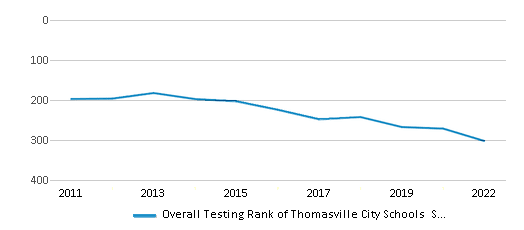
Math Test Scores (% Proficient)
28%
51%
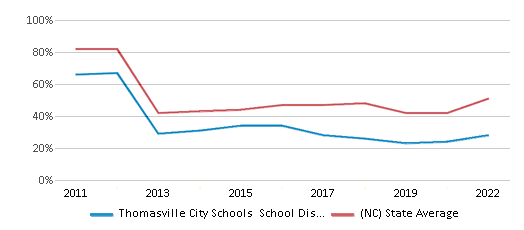
Reading/Language Arts Test Scores (% Proficient)
26%
50%
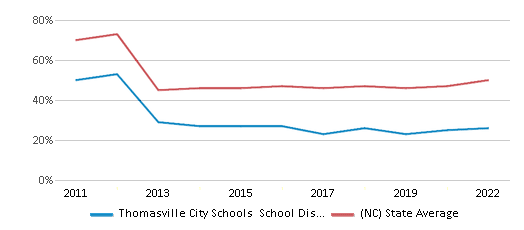
Science Test Scores (% Proficient)
49%
63%
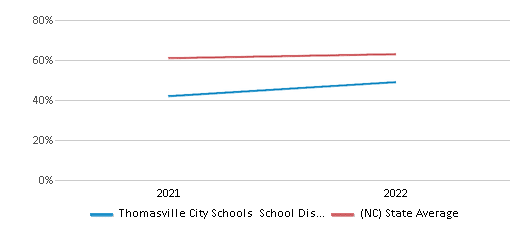
Graduation Rate
80-84%
86%
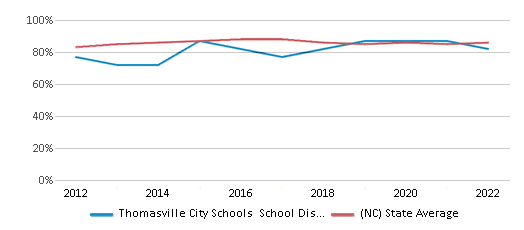
Students by Ethnicity:
Diversity Score
0.69
0.72
# American Indian Students
6 Students
6,572 Students
% American Indian Students
n/a
1%
# Asian Students
23 Students
18,458 Students
% Asian Students
1%
4%
# Hispanic Students
834 Students
105,943 Students
% Hispanic Students
39%
23%
# Black Students
820 Students
114,509 Students
% Black Students
38%
25%
# White Students
311 Students
189,147 Students
% White Students
14%
41%
# Hawaiian Students
3 Students
648 Students
% Hawaiian Students
n/a
n/a
# Two or more races Students
180 Students
28,778 Students
% of Two or more races Students
8%
6%
Students by Grade:
# Students in PK Grade:
73
23,104
# Students in K Grade:
174
72,144
# Students in 1st Grade:
165
74,289
# Students in 2nd Grade:
189
75,942
# Students in 3rd Grade:
155
68,925
# Students in 4th Grade:
167
69,686
# Students in 5th Grade:
175
66,668
# Students in 6th Grade:
165
5,021
# Students in 7th Grade:
162
3,684
# Students in 8th Grade:
156
3,629
# Students in 9th Grade:
177
214
# Students in 10th Grade:
178
194
# Students in 11th Grade:
149
187
# Students in 12th Grade:
92
368
# Ungraded Students:
-
-
District Revenue and Spending
The revenue/student of $17,041 is higher than the state median of $11,187. The school district revenue/student has stayed relatively flat over four school years.
The school district's spending/student of $14,025 is higher than the state median of $11,612. The school district spending/student has stayed relatively flat over four school years.
Total Revenue
$37 MM
$17,307 MM
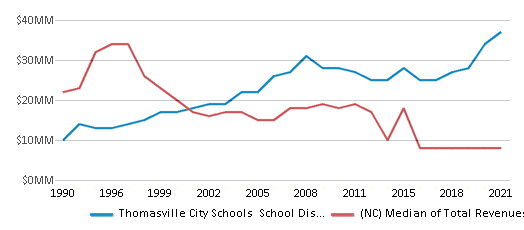
Spending
$31 MM
$17,964 MM
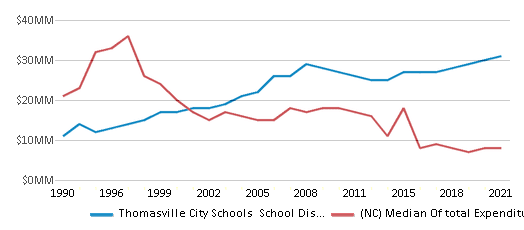
Revenue / Student
$17,041
$11,187
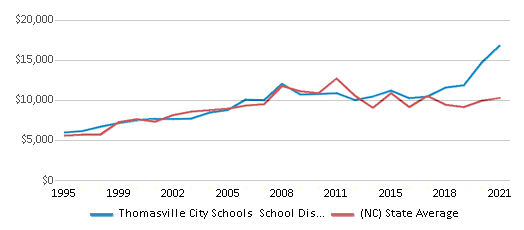
Spending / Student
$14,025
$11,612
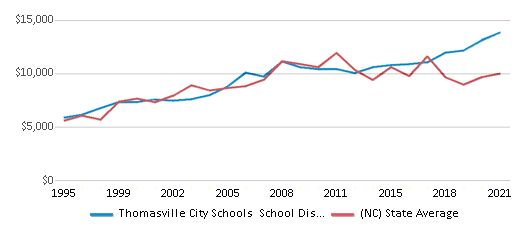
Best Thomasville City Schools School District Public Preschools (2025)
School
(Math and Reading Proficiency)
(Math and Reading Proficiency)
Location
Grades
Students
Rank: #11.
Thomasville Primary
(Math: 35-39% | Reading: 25-29%)
Rank:
Rank:
2/
Bottom 50%10
915 E Sunrise Avenue
Thomasville, NC 27360
(336) 474-4160
Thomasville, NC 27360
(336) 474-4160
Grades: PK-3
| 756 students
Recent Articles

Year-Round Or Traditional Schedule?
Which is more appropriate for your child? A year-round attendance schedule or traditional schedule? We look at the pros and cons.

Why You Should Encourage Your Child to Join a Sports Team
Participating in team sports has a great many benefits for children, there is no doubt. In this article you will learn what those benefits are.

White Students are Now the Minority in U.S. Public Schools
Increasing birth rates among immigrant families from Asia and Central and South America, combined with lower birth rates among white families, means that for the first time in history, public school students in the United States are majority-minority. This shift in demographics poses difficulties for schools as they work to accommodate children of varying language abilities and socio-economic backgrounds.





